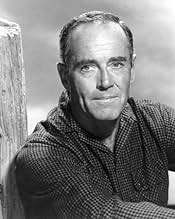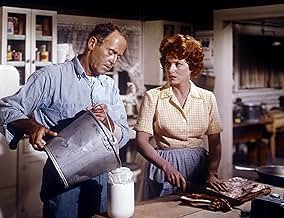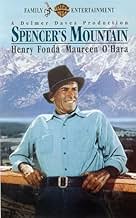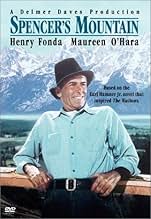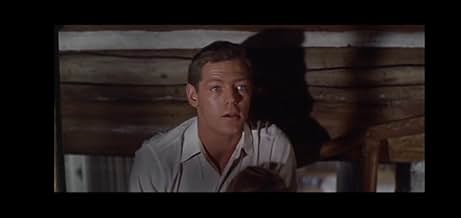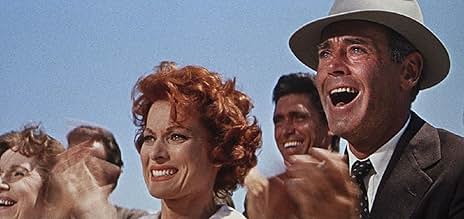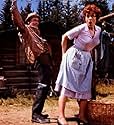AVALIAÇÃO DA IMDb
7,0/10
3,4 mil
SUA AVALIAÇÃO
Adicionar um enredo no seu idiomaGrand Teton quarryman and family patriarch carefully navigates issues of religion and education in order to eke out a brighter future for his family.Grand Teton quarryman and family patriarch carefully navigates issues of religion and education in order to eke out a brighter future for his family.Grand Teton quarryman and family patriarch carefully navigates issues of religion and education in order to eke out a brighter future for his family.
- Direção
- Roteiristas
- Artistas
- Prêmios
- 1 indicação no total
William Breen
- Mountain Boy
- (não creditado)
Veronica Cartwright
- Becky Spencer
- (não creditado)
Michele Daves
- Donnie Spencer
- (não creditado)
Martin Eric
- Odell Harper
- (não creditado)
- Direção
- Roteiristas
- Elenco e equipe completos
- Produção, bilheteria e muito mais no IMDbPro
Avaliações em destaque
I had seen this movie in high school with a friend I grew up with and his family at a Drive-In, and it made such an impression on me at that time, probably because of the wholesomeness of the whole thing; I saw it several times thereafter, but, until recently had not viewed it for years; I bought the DVD version and watched it last night and it was just as I had remembered it, a family movie, the likes of which you will never see again.... I especially enjoyed the extras, including the premiere newsreel and interviews; the scenery is breathtaking especially on a large screen TV, and the story always keeps your interest...it is hard to explain, but to someone of my generation, they just don't make them like this anymore!! What a joy to see such actors as Henry Fonda, Maureen O'Hara, Wally Cox, Virginia Gregg, Lillian Bronson, and Donald Crisp displaying their fine talents in this film... IT was interesting to see what a fine job James MacArthur did prior to Hawaii Five O, as he had done in several Disney pictures of the era....there is a very young Kim Karayth, who later went on to fame as the youngest sibling in The Sound Of Music and other family pictures, and Veronica Cartwright, who played on many television series and also in the Hitchcock thriller "The Birds." This was the heyday of family moviemaking...where did it all go??
Leonard Maltin calls the film "mawkish", and he is right on, but it is still great fun. Mimsy Farmer's Claris is a hoot ("friction, friction, friction!")! Excellent use of the Jackson Hole locations, especially the Triangle X guest ranch, which served as the Spencer homestead and is still in operation here. Two trivia notes: Bronwyn Fitzsimmons, who played the college secretary, is Maureen O'Hara's daughter in real life. According to AMC Magazine, Henry Fonda showed some off-screen interest in her that O'Hara had to squash. Fonda did the film even though he thought it was so corny it would set U.S. movie-making back 20 years. Also, you have Wally Cox's character listed as GoodMAN, but the name was actually GoodSON. Highly recommended.
Before The Waltons, there was Spencer's Mountain. Based on the autobiographical novel by Earl Hamner, Jr, this heartwarming family drama fathered the beloved TV series and features all its familiar ingredients-poor family with nine children struggling to make ends meet, rural setting, live-in grandparents, gifted oldest son, mother named Livvie, coming-of-age crises-the list goes on and on. Even the famous (and corny) "good night" ritual debuts here; the names may be different (there's no Mary Ellen, Jason or Jim-Bob), but the indelible long shot-darkened house with one lamp burning in an upstairs window-is framed exactly as it would be on television nine years later.
Along with the similarities, though, come some changes. Instead of Depression-era Appalachia, the Spencers confront their problems in contemporary Wyoming, affording a more dramatic backdrop and the ability to deal with modern mores. And instead of John-Boy, we have Clay-Boy (James MacArthur), the oldest son of Clay Spencer (Henry Fonda) and his wife (Maureen O'Hara). While Clay-Boy is not an aspiring writer like his TV counterpart (and flaunts a decidedly more beefy physique), he does win top honors in his high school class and harbors a potent desire to attend college and escape his sheltered mountain life. Clay-Boy's efforts to meet the university's academic and financial requirements, as well as Clay Sr.'s burning wish to build his dream house, are among the everyday issues the Spencers must face.
Maybe if The Waltons never existed, Spencer's Mountain would better stand the test of time. But so ingrained is The Waltons in our collective conscience, it's difficult to divorce Spencer's Mountain from it-and from the elements that have prompted merciless parody over the years. The folksy, homespun attitudes that permeate Delmer Daves' production alternately provoke charmed smiles and withering cringes, usually depending on who is speaking the lines. And while the film benefits from breathtaking location shooting in Grand Teton National Park, even the majestic snow-capped peaks can't dilute the sugar coating that drips from many scenes.
Unfortunately, the younger actors bear the brunt of the blame. MacArthur tries his best, but often is sabotaged by the annoying Mimsy Farmer (yes, Mimsy) as Clay-Boy's sweetheart Claris, whose hormones rage so ferociously she practically eats Clay-Boy alive during their breathy love scenes. Such frank treatment of blossoming sexuality is commendable, but seems laughably inappropriate in such a family-oriented film, at times transforming Spencer's Mountain into a watered-down version of A Summer Place (interestingly enough, also directed by Daves).
Fonda and O'Hara, on the other hand, make an ideal couple, acting with an ease and familiarity that gives their relationship a warm, comfortable feel. Fonda especially embodies the uneducated, hard-drinking, heart-of-gold Clay Sr., always willing to fight and sacrifice so his brood can enjoy a richer, more prosperous life. Without a doubt, Fonda is the soul of Spencer's Mountain, and his natural, beautifully shaded portrayal keeps the film from descending into a maudlin mess.
Despite its shortcomings, Spencer's Mountain is tough to knock. Featuring forthright, salt-of-the-earth characters, timeless family themes and lovely cinematography, it wiggles its way into the heart and, like the noble Spencers, we graciously forgive its faults.
Along with the similarities, though, come some changes. Instead of Depression-era Appalachia, the Spencers confront their problems in contemporary Wyoming, affording a more dramatic backdrop and the ability to deal with modern mores. And instead of John-Boy, we have Clay-Boy (James MacArthur), the oldest son of Clay Spencer (Henry Fonda) and his wife (Maureen O'Hara). While Clay-Boy is not an aspiring writer like his TV counterpart (and flaunts a decidedly more beefy physique), he does win top honors in his high school class and harbors a potent desire to attend college and escape his sheltered mountain life. Clay-Boy's efforts to meet the university's academic and financial requirements, as well as Clay Sr.'s burning wish to build his dream house, are among the everyday issues the Spencers must face.
Maybe if The Waltons never existed, Spencer's Mountain would better stand the test of time. But so ingrained is The Waltons in our collective conscience, it's difficult to divorce Spencer's Mountain from it-and from the elements that have prompted merciless parody over the years. The folksy, homespun attitudes that permeate Delmer Daves' production alternately provoke charmed smiles and withering cringes, usually depending on who is speaking the lines. And while the film benefits from breathtaking location shooting in Grand Teton National Park, even the majestic snow-capped peaks can't dilute the sugar coating that drips from many scenes.
Unfortunately, the younger actors bear the brunt of the blame. MacArthur tries his best, but often is sabotaged by the annoying Mimsy Farmer (yes, Mimsy) as Clay-Boy's sweetheart Claris, whose hormones rage so ferociously she practically eats Clay-Boy alive during their breathy love scenes. Such frank treatment of blossoming sexuality is commendable, but seems laughably inappropriate in such a family-oriented film, at times transforming Spencer's Mountain into a watered-down version of A Summer Place (interestingly enough, also directed by Daves).
Fonda and O'Hara, on the other hand, make an ideal couple, acting with an ease and familiarity that gives their relationship a warm, comfortable feel. Fonda especially embodies the uneducated, hard-drinking, heart-of-gold Clay Sr., always willing to fight and sacrifice so his brood can enjoy a richer, more prosperous life. Without a doubt, Fonda is the soul of Spencer's Mountain, and his natural, beautifully shaded portrayal keeps the film from descending into a maudlin mess.
Despite its shortcomings, Spencer's Mountain is tough to knock. Featuring forthright, salt-of-the-earth characters, timeless family themes and lovely cinematography, it wiggles its way into the heart and, like the noble Spencers, we graciously forgive its faults.
"Spencer's Mountain" is an enjoyable family drama with touches of humor throughout. The outdoor scenery is spectacular. The film was shot in Grand Teton National Park, around Jackson Hole, WY, and in California. The movie is based on a 1961 novel of the same title, by Earl Hamner Jr. Some of the characters and experiences in the film are from his background, growing up near the Blue Ridge Mountains of Virginia during the Great Depression.
Hamner would write another novel in 1970 that further expands on his boyhood growing up as the oldest child in a large family. That book, "The Homecoming: A Novel About Spencer's Mountain," led to the 1971 movie by the same title that in turn spawned the nine-year TV series, "The Waltons."
I don't know why this film was set in Wyoming instead of Virginia, but the expansive shots of the scenery could be one reason. By the middle 20th century, it would have been hard to find shots like that in Virginia that didn't show much more modern development. "The Homecoming" was also shot in Wyoming in 1971, although the story was clearly set in Virginia.
Many people who watched the later film and then the Waltons on TV (1972- 81) didn't know that this movie was part of Hamner's story of Walton's Mountain as well.
The cast of "Spencer's Mountain' is very good. Henry Fonda excelled as Clay Spencer. Another reviewer commented about the types of role he played, and I agree that Fonda was best with this type of role. He also was good with dramatic roles, in Westerns and some others. And while he made some 30 comedy films, most were just so-so. He was exceptional as a straight man in two top-rated comedies that had top casts and great scripts - "The Moon's Our Home " of 1936 and "The Lady Eve" of 1941.
Maureen O'Hara is wonderful as Olivia Spencer and James MacArthur plays Clayboy. That's the role that Richard Thomas had in the later film and the series as John-Boy. The rest of the cast are all quite good.
This is a somewhat different story than what Hamner writes for the Waltons. The special home that Clay starts to build for Olivia, and then the fire that destroys it. It's an interesting and entertaining movie that most should enjoy.
Hamner would write another novel in 1970 that further expands on his boyhood growing up as the oldest child in a large family. That book, "The Homecoming: A Novel About Spencer's Mountain," led to the 1971 movie by the same title that in turn spawned the nine-year TV series, "The Waltons."
I don't know why this film was set in Wyoming instead of Virginia, but the expansive shots of the scenery could be one reason. By the middle 20th century, it would have been hard to find shots like that in Virginia that didn't show much more modern development. "The Homecoming" was also shot in Wyoming in 1971, although the story was clearly set in Virginia.
Many people who watched the later film and then the Waltons on TV (1972- 81) didn't know that this movie was part of Hamner's story of Walton's Mountain as well.
The cast of "Spencer's Mountain' is very good. Henry Fonda excelled as Clay Spencer. Another reviewer commented about the types of role he played, and I agree that Fonda was best with this type of role. He also was good with dramatic roles, in Westerns and some others. And while he made some 30 comedy films, most were just so-so. He was exceptional as a straight man in two top-rated comedies that had top casts and great scripts - "The Moon's Our Home " of 1936 and "The Lady Eve" of 1941.
Maureen O'Hara is wonderful as Olivia Spencer and James MacArthur plays Clayboy. That's the role that Richard Thomas had in the later film and the series as John-Boy. The rest of the cast are all quite good.
This is a somewhat different story than what Hamner writes for the Waltons. The special home that Clay starts to build for Olivia, and then the fire that destroys it. It's an interesting and entertaining movie that most should enjoy.
Adapted from the autobiographical novel by Earl Hamner, Jr., "Spencer's Mountain" is, firstly, a nostalgic look at a way of life from the viewpoint of the writer. Released in 1963, the story undoubtedly had great appeal for those who see that way of life as quintessentially "the American way".
Set in New Dominion, the name is the first clue to the outlook of the residents (and the film's producers). "Dominion" might be translated as a territory under God's authority or control. Religion is one of the subjects of the film. But life in New Dominion has a simplicity that is a central theme.
In this valley that nestles under the Grand Tetons, there are only two churches. There are also few choices of occupation, few neighbors, and few visitors. Residents are connected to the land in an elemental way--mostly through farming, quarrying or via the lumber mill. One unstated but permeating message of the film is the goodness and value associated with such a connection.
The central character is Clay Spencer (Henry Fonda), father of eight and salt of the earth. Living under sparkling blue skies, he and his wife, Olivia (Maureen O'Hara), raise their children to be kind and to have dreams. Another central theme of the film is the value of dreams. The family is dedicated to the purpose of sending the oldest child, Clayboy (James MacArthur), to college.
One of their long-term projects is a dream house set on an idyllic hillside overlooking the valley and the grandeur of the mountains.
As Clay and his family strive for their dreams and negotiate the hardships that intervene in all lives, the viewer is treated to vignettes that are dipped in Disney and Doris Day. Bountiful streams and pastures bursting with fecundity frame a Norman Rockwellian world even homier and more basic than Mayberry. The film has been accused of mawkishness and justifiably so. No chance is missed to sing a hymn, recognize a milepost of life, wave the American flag or jerk a tear from a moment.
But that is not all bad. The film does what it does very well. Henry Fonda's voice almost feels like the bedrock that supports the entire family. The rosy-cheeked cast is the perfect picture of God's grace. The end product feels very iconic and touching, no doubt extracting tears from numerous scenes. I wish the sentimentality had been dialed down a notch--like when "America" is unnecessarily played behind the toasting of Clayboy.
"Spencer's Mountain" was well-designed for audiences in 1963. Even with it's overly sentimental tone, it has a wholesomeness and a respect for values that will appeal to viewers of any era.
Later, the story would be adapted again as TV's "The Waltons".
Set in New Dominion, the name is the first clue to the outlook of the residents (and the film's producers). "Dominion" might be translated as a territory under God's authority or control. Religion is one of the subjects of the film. But life in New Dominion has a simplicity that is a central theme.
In this valley that nestles under the Grand Tetons, there are only two churches. There are also few choices of occupation, few neighbors, and few visitors. Residents are connected to the land in an elemental way--mostly through farming, quarrying or via the lumber mill. One unstated but permeating message of the film is the goodness and value associated with such a connection.
The central character is Clay Spencer (Henry Fonda), father of eight and salt of the earth. Living under sparkling blue skies, he and his wife, Olivia (Maureen O'Hara), raise their children to be kind and to have dreams. Another central theme of the film is the value of dreams. The family is dedicated to the purpose of sending the oldest child, Clayboy (James MacArthur), to college.
One of their long-term projects is a dream house set on an idyllic hillside overlooking the valley and the grandeur of the mountains.
As Clay and his family strive for their dreams and negotiate the hardships that intervene in all lives, the viewer is treated to vignettes that are dipped in Disney and Doris Day. Bountiful streams and pastures bursting with fecundity frame a Norman Rockwellian world even homier and more basic than Mayberry. The film has been accused of mawkishness and justifiably so. No chance is missed to sing a hymn, recognize a milepost of life, wave the American flag or jerk a tear from a moment.
But that is not all bad. The film does what it does very well. Henry Fonda's voice almost feels like the bedrock that supports the entire family. The rosy-cheeked cast is the perfect picture of God's grace. The end product feels very iconic and touching, no doubt extracting tears from numerous scenes. I wish the sentimentality had been dialed down a notch--like when "America" is unnecessarily played behind the toasting of Clayboy.
"Spencer's Mountain" was well-designed for audiences in 1963. Even with it's overly sentimental tone, it has a wholesomeness and a respect for values that will appeal to viewers of any era.
Later, the story would be adapted again as TV's "The Waltons".
Você sabia?
- CuriosidadesIn their book "How Underdog Was Born...", W. Watts Biggers and Chad Strover reveal that seeing Wally Cox's performance in this movie inspired them to ask him to voice their newly created character, Underdog.
- Erros de gravaçãoInfo on the film lists Wally Cox's character as Reverend "Goodman", but he calls himself Goodson, as does the rest of the cast.
- Citações
Miss Parker: The world steps aside to let any man pass if he knows where he is going.
- ConexõesFeatured in AFI Life Achievement Award: A Tribute to Henry Fonda (1978)
- Trilhas sonorasAmerica the Beautiful
(uncredited)
Words by Katharine Lee Bates 1904
Music by Samuel A. Ward, 1882
Sung by Barbara McNair
Principais escolhas
Faça login para avaliar e ver a lista de recomendações personalizadas
- How long is Spencer's Mountain?Fornecido pela Alexa
Detalhes
- Tempo de duração
- 1 h 58 min(118 min)
- Mixagem de som
- Proporção
- 2.35 : 1
Contribua para esta página
Sugerir uma alteração ou adicionar conteúdo ausente


